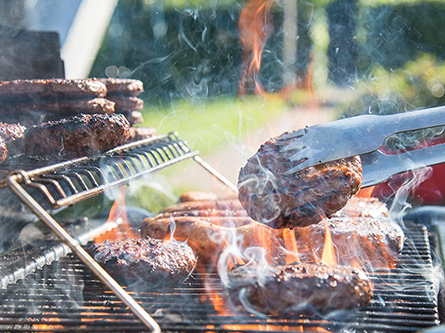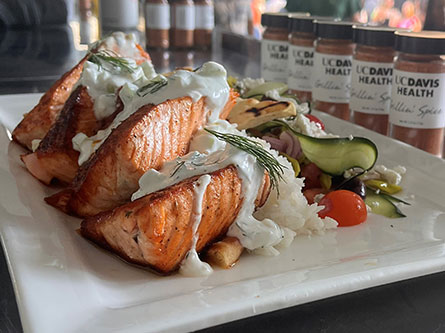It's an American tradition to turn up the barbecue when the weather heats up. However, many studies have shown that grilling can lead to a variety of carcinogens in meat.
Before cooking your favorite meats on the grill, check out these nine tips to a safe and healthy barbecued meal:
- Don’t use a wire-bristle brush for cleaning: Between 2002 and 2016, these brushes were responsible for more than 1,600 emergency room visits, according to a 2016 study. Wire bristles can come off the brush during cleaning and end up in your food, causing painful injuries. Try using a stone grill cleaner as a safer option.
- Marinade your meat: Charring and cooking meat, poultry and fish on high heat causes potentially cancer-causing compounds to form, according to the American Institute for Cancer Research (AICR). Studies show that marinating meat, poultry and fish for at least 30 minutes can reduce the formation of these substances. A mixture of vinegar, lemon juice or wine, with herbs and spices seem to be most effective, according to the AICR.
- Thaw your meat in the refrigerator: A common mistake of grillers is to leave meat on the counter to thaw. This room-temperature thaw can lead to the growth of dangerous bacteria, according to the USDA. Remember that a pound of ground meat needs at least a day in the fridge to fully thaw. If you need it sooner, tightly seal the frozen meat in a plastic bad and put it in cold water until it’s ready to grill.
- Partially cook before you grill: If you reduce the time meat spends exposed to flames by partially cooking it in a microwave, oven or stove, you can limit the amount of carcinogenic substances you eat, according to the AICR. However, you should make sure to put the partially cooked meat immediately on the grill to eliminate bacteria.
- Cook meat over a low flame: Doing this can reduce potentially cancer-causing compounds and can lessen the amount of burning or charring, according to the AICR. Keep juices and fat out of the fire to reduce flare-ups. It’s also recommended to cut off any charred parts of the meat before eating.
- Use a thermometer: Cook poultry to an internal temperature of 165° to 185° Fahrenheit. Ground beef, pork and lamb should be cooked to an internal temperature of 160° to 170° Fahrenheit. Beef, steaks and roasts should cook to 145° to 160° Fahrenheit. Meat shouldn’t be cooked until it’s “well done.”
- Add some color on the grill: Vegetables and fruits have fiber and vitamins, which can add anti-cancer benefits to your meal. Plus, eating more of these good foods might mean you eat less red meat.
- Switch out utensils: Once you place raw meat on the grill with utensils, make sure you swap them out for some clean ones. Otherwise, you can transfer bacteria from the raw meat to your cooked meat.
- Flip your burgers often: Turning patties once a minute can lessen the chance of carcinogenic substances from forming by up to 100 percent, according to researchers at the UC Davis Comprehensive Cancer Center.




